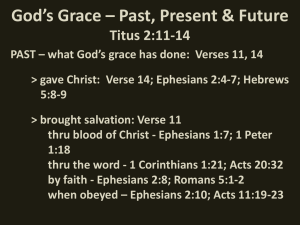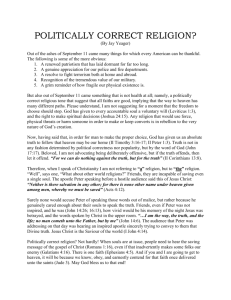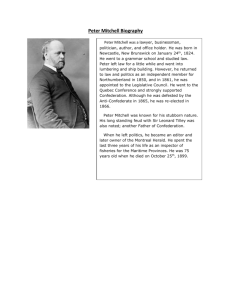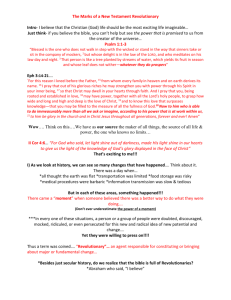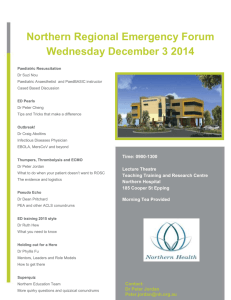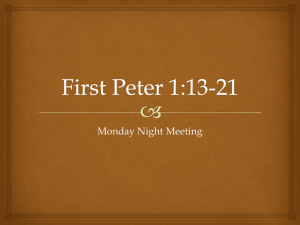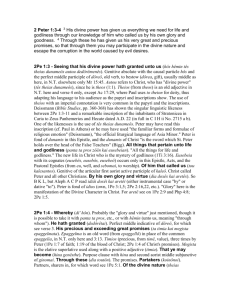May 12 2013
advertisement
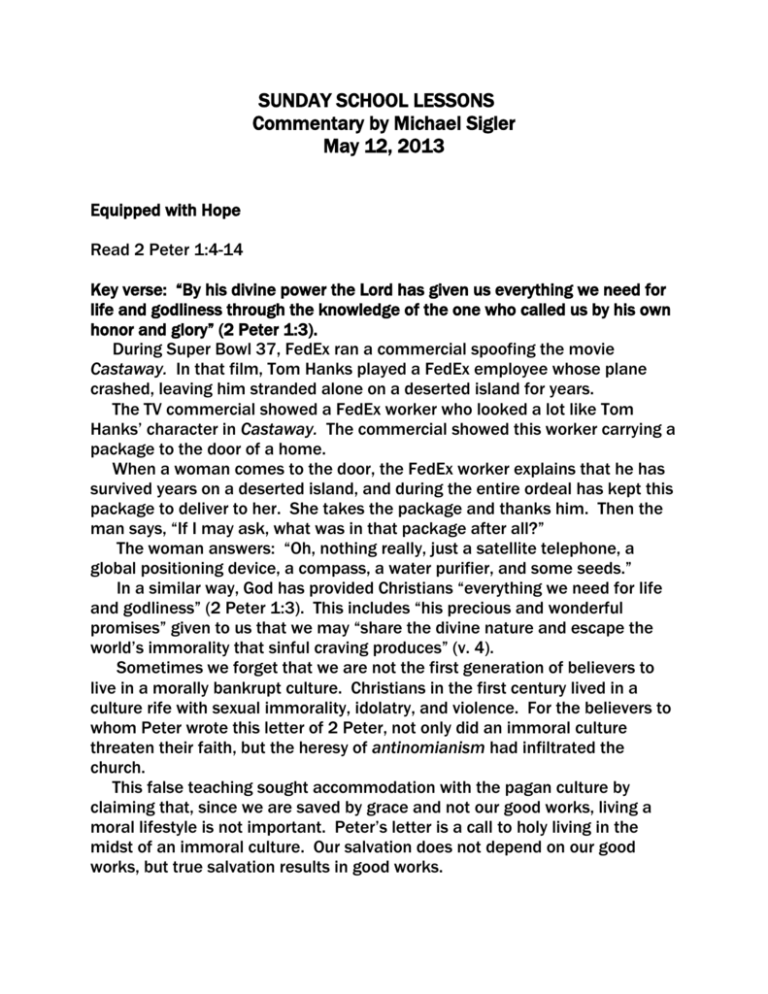
SUNDAY SCHOOL LESSONS Commentary by Michael Sigler May 12, 2013 Equipped with Hope Read 2 Peter 1:4-14 Key verse: “By his divine power the Lord has given us everything we need for life and godliness through the knowledge of the one who called us by his own honor and glory” (2 Peter 1:3). During Super Bowl 37, FedEx ran a commercial spoofing the movie Castaway. In that film, Tom Hanks played a FedEx employee whose plane crashed, leaving him stranded alone on a deserted island for years. The TV commercial showed a FedEx worker who looked a lot like Tom Hanks’ character in Castaway. The commercial showed this worker carrying a package to the door of a home. When a woman comes to the door, the FedEx worker explains that he has survived years on a deserted island, and during the entire ordeal has kept this package to deliver to her. She takes the package and thanks him. Then the man says, “If I may ask, what was in that package after all?” The woman answers: “Oh, nothing really, just a satellite telephone, a global positioning device, a compass, a water purifier, and some seeds.” In a similar way, God has provided Christians “everything we need for life and godliness” (2 Peter 1:3). This includes “his precious and wonderful promises” given to us that we may “share the divine nature and escape the world’s immorality that sinful craving produces” (v. 4). Sometimes we forget that we are not the first generation of believers to live in a morally bankrupt culture. Christians in the first century lived in a culture rife with sexual immorality, idolatry, and violence. For the believers to whom Peter wrote this letter of 2 Peter, not only did an immoral culture threaten their faith, but the heresy of antinomianism had infiltrated the church. This false teaching sought accommodation with the pagan culture by claiming that, since we are saved by grace and not our good works, living a moral lifestyle is not important. Peter’s letter is a call to holy living in the midst of an immoral culture. Our salvation does not depend on our good works, but true salvation results in good works. Furthermore, Peter makes it clear that authentic salvation involves our effort cooperating with God’s grace. “This is why you must make every effort to add” to your faith the following virtues or character qualities: moral excellence, knowledge, self-control, endurance, godliness, affection for others, and love (vv. 5-9). 1. “moral excellence” - In an immoral culture God’s people are to be examples of moral excellence. 2. “knowledge” – the kind of practical, spiritual knowledge that helps us know how to live for God each day. 3. “self-control” – Contrary to the teaching of antinomianism, Christians are to live lives of self-control. 4. “endurance” – Christian character involves a commitment to keep on keeping on doing God’s will no matter what the obstacles. 5. “godliness” – Someone defined godliness as “a genuine reverence toward God that governs one’s attitude toward every aspect of life.” 6. “affection for others” – The word used here means “brotherly love” and refers especially to a warmhearted affection for fellow Christians. 7. “love” – that is, Christ-like love, the kind of love that is willing to sacrifice for the good of others. Peter adds: “If all these are yours and they are growing in you, they’ll keep you from becoming inactive and unfruitful in the knowledge of our Lord Jesus Christ” (v. 8). “Whoever lacks these things,” Peter warns, “is shortsighted and blind, forgetting that they were cleansed from their past sins” (v. 9). We are not saved by our good works, but authentic faith results in a changed life. That change, that growth, involves our effort cooperating with God’s grace. So, we must be diligent, “make every effort,” to keep growing in godliness. Dallas Willard, the Christian author, teacher, and “spiritual formation” expert said: “The abundance of God is not passively received and does not happen to us by chance. The abundance of God is claimed and put into action by our active pursuit of it. We must act in union with the flow of God’s kingdom life that comes through our relationship with Jesus. “We cannot do this, of course, purely on our own. But we must act. Grace is contrasted with earning but not with effort. Well-directed, decisive, and sustained effort is the key to the keys of the kingdom and to the life of restful power in ministry.” Verses 10-11 go a step further. They remind us that growth in Christ and in the Christian virtues of verses 5-9 are evidence of our salvation. One of the ways we can have assurance of salvation is by seeing the change Christ has made and is making in us. As someone once said: “I’m not yet the person I want to be but, thank God, I’m not the person I used to be!” Our growth in Christ is not always rapid growth. In fact, it may at times seem very slow. But as we look back on our lives, we should be able to see that his grace has changed us. This growth in grace assures us that we are his saved children and that heaven is our destination. This is what Peter has in mind when he writes: “Therefore, brothers and sisters, be eager to confirm your call and election. Do this and you will never ever be lost. For in this way you will receive a rich welcome into the everlasting kingdom of our Lord and savior Jesus Christ” (vv. 10-11). (Contact Michael at msigler@fumcfwb.com.)

